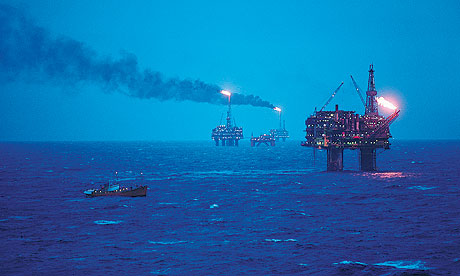When It Comes To The Climate Crisis, Gradualism Is A Form Of Denial


*
This initiative is already being trialled in Norway by the country’s state-owned petroleum company, Equinor, Wheelhouse said, and could help the UK oil industry realize its “low carbon ambitions” ahead of the COP26 climate summit in Glasgow later this year.
*
As a metaphor for political complacency in the face of environmental collapse, harnessing green energy for the benefit of the fossil fuel lobby seems a bit heavy-handed to me. But it’s entirely consistent with the SNP’s broader approach to the climate crisis.
*
On one hand, the party wants to be seen as a champion of decarbonization and has pledged to achieve carbon neutrality for Scotland within the next 25 years. On the other, it remains staunchly committed to a policy of maximum economic extraction from the UK continental shelf.
*
In 2017, Kirsty Blackman, the SNP MP for Aberdeen North, criticized the British government for moving at a “glacial pace” in its efforts to cut taxes for oil and gas companies. In 2019, Maureen Watt, the SNP MSP for Aberdeen South, welcomed the prospect of another 12 billion barrels of oil being dredged from Scottish waters by 2050.
*
The 2050 timeline is apt because, according to the UN, this is the official cut-off point for planetary survival. If we haven’t all but eliminated greenhouse gas emissions by then, global temperatures will rise by up to 3 or 4 degrees Celsius by 2100, ushering in a series of apocalyptic shifts in the environment and fundamentally transforming the way we, and every other species on Earth, live.
*
The SNP isn’t alone in positioning itself at the forefront of the fight against climate change while simultaneously bolstering the carbon economy.
*
In Canada, Justin Trudeau presents himself as a ‘global climate leader.’ But just four months after winning a second term in office, the Liberal prime minister is considering approval for a new bitumen mine twice the size of Vancouver that experts say will boost emissions from Canadian oil-sands by one fifth over the next three decades.
*
If it goes ahead, the project “could make it impossible to achieve [Canada’s] long-term climate targets,” the environmental journalist Geoff Dembicki wrote recently. “Not to mention the near-term Paris agreement targets Canada is already on track to miss because of [existing] emissions.”
*


*
At the same time, Norway has 87 active oil fields and, in line with current industrial projections, overall Norwegian oil and gas production will continue until 2070 — well passed the point of no return for the global climate and long after the international oil industry should’ve been irrevocably shut down.
*
Norway’s addiction to carbon is so severe — the oil and gas sector accounts for 18 per cent of Norwegian GDP and 62 per cent of its export revenue — that the country even earned a reprimand last year from the UN.
*
“Norway should stop exploring for additional oil and gas reserves,” David Boyd, the UN special rapporteur on human rights and the environment, said in September. “Emissions from [the Norwegian] petroleum industry … are well above 1990 levels … despite clear evidence that human society cannot burn existing reserves while meeting the targets established in the Paris agreement.”
*
Centrist leaders are sufficiently conscious of this hypocrisy to try and dress it up in ostensibly progressive political language.
*
Nicola Sturgeon and Justin Trudeau both say they have a responsibility to safeguard jobs — in Aberdeenshire and Alberta, respectively — against an accelerated transition away from non-renewable industries.
*
Indeed, during the 2019 general election campaign, Sturgeon even claimed that winding the North Sea sector down too quickly would produce the same economic results as Thatcherism. “I saw the effects of [de]industrialization in the 1980s,” she told Channel 4 News in December. “We can’t make that mistake again.”
*
Oslo, meanwhile, insists that its oil and gas is much cleaner than the alternative sources of energy — coal from Ukraine, for instance — that would flood the European market in the absence of Norwegian supplies.
*
All this reasoning ultimately amounts to, however, is yet more inertia.
*
The Intergovernmental Panel on Climate Change says emissions have to fall by 45 per cent over the coming decade in order to stop large swathes of the planet becoming uninhabitable. And Antonio Guterres, the UN general secretary, believes the political decisions that will determine whether or not we meet that marker will be made in the next 12 months.
*
If it isn’t apparent by now, it should be: we can’t triangulate our way around the climate crisis. Either we are reducing carbon emissions rapidly enough to avoid catastrophic levels of global warming — or we aren’t.
*
One thing’s for sure: fixing wind turbines to oil rigs isn’t going to cut it.

“We can’t make that mistake again.” said Nicola Sturgeon. We only make the mistake that leads to planet temperature rise and increased sea levels once. Thanks, Jamie, for a timely piece.
Thank god for Scotland’s Oil Fund to fall back on. 0
One of the quickest way to decarbonise a nation is indeed to maximise fossil fuel extraction, which maximises fossil fuel burning, given that EROEI of the energy we are getting out of the ground is getting lower and lower. Fracking for instance, has EROEI of less than 1.
The accelerated rate of fossil fuel burning caused by ramping up fossil fuel extraction will then bring forward the collapse of global industrial civilisation sooner, resulting in a massive reduction of CO2 emissions as the 90% population overshoot is corrected by Mother Nature.
So, these neo-liberal fucktards are indeed correct in that they will decarbonise by 2050, just not in the way think they will.
Not that the left’s Green New Deal in various opposition parties around the world is much better. The colossal infrastructure programme required would save the oil companies from bankruptcy, and give them license to print even more debt with further oil and gas extraction.
Interesting new data from Tim Watkin’s Consciousness of Sheep blog last week. In the decade 2010-2018 the top 5 oil companies issued $500billion in share dividends, but only sold $300 billion of oil/gas. The shortfall was made up by borrowing and selling assets.
https://consciousnessofsheep.co.uk/2020/01/22/be-careful-what-you-wish-for-2/
In other words, they are, like koala bears, all functionally extinct, they just haven’t all died yet. If we took away the $5 trillion annual “investment” of public funds into these companies, they would go bankrupt pretty damn quick. Ironically the divestment programme, if fully carried out, might bring about decarbonisation in the quickest way possible, but again, not in the way these people intend.
If 2019 was round one in Gaia’s rebalancing, with floods, firestorms and droughts of unprecedented magnitude, it seems round two in 2020 is starting with coronavirus, which is already slowing down the worlds’ economies. Even if that takes out the 65,000,000 predicted in last October’s corporate modelling, the world population clock shows 83,000,000 births in the last 12 months, an increase from the 81,000,000 in the previous 12 months.
We’re so far removed from “decarbonising” anywhere in the world that coal coloured flying pigs are more likely.
Spot on
Excellent, urgent, just what’s needed. I’ve tweeted it out, hope others will do likewise.
I watched the latest Panorama: Britain’s Killer Motorways about the Westminster government’s ‘solution’ to traffic-choked traditional motorway congestion: turn them into ‘smart’ motorways by converting the hard shoulder into a live lane, and strew some far-apart refuge bays along the way instead. Predictably the death has climbed and near-miss incidents have soared.
https://www.bbc.co.uk/iplayer/episode/m000dtqv/panorama-britains-killer-motorways
Yet, the obvious problem (irrational and unsustainable transportation choices) was not addressed. Why not solve it by banning private cars and moving freight to rail and developing renewable-powered light transit infrastructure?
I think the psychology of car ownership and commercial vehicle driving needs urgent attention. It may be that significant numbers of men use their cars to visit prostitutes or other ‘entertainments’ whilst significant numbers of women and minorities use private transport to avoid sexual harrassment and white van drivers cruise about in the hope of abducting victims. Perhaps then we could build green vehicles that transformed into sex robots, private transport pods that attached to electric road-trains for joined-up journeying, and make all commercial vehicles transparent by law and no faster than a milk float.
I think the article is right about hypocrisy, and we also have to consider that fossil fuel companies have spent billions of those public trillions on corrupting the public conscience.
There’s usually someone who will comment, on articles like the above, that; “we are all addicted to oil and we can’t do without it, it powers our world!”
Perhaps it is actually money that some of us are addicted to? Perhaps it’s forsaking oil-dollars, rather than the oil itself that is the problem?
I’d be up for the massive, radical upset that ditching oil would mean; banning private transport, ditching oil-based fertiliser, cutting single-use plastic, etc. It could be pretty exciting in the context of a safely managed global endeavour.
I agree with the thesis that significant actions are needed as soon as possible. However, it is all very well to chastise governments for insufficient actions, but how do we change the public consensus so that the changes are politically acceptable? Whether we like it or not, much of politics is aimed at the short term. Governments are making plans for the longer term and most politicians know that we need to do more, and most producers of pollutants (i.e. most of us, with our boilers, cars, etc) accept the need to change, but we need to be able to see ways of making the adjustments, not least of being able to pay for them.